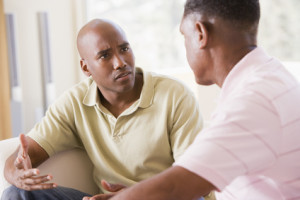Contributor: W. Travis Stewart, LPC, NCC writer for Addiction Hope
 Step 8: “Made a list of all persons we had harmed, and became willing to make amends to them all.”
Step 8: “Made a list of all persons we had harmed, and became willing to make amends to them all.”
“It takes a tremendous amount of courage to become the person you truly want to become.”
—Justin Miller
According to Alcoholics Anonymous “Steps Eight and Nine are concerned with personal relations. First, we take a look backward and try to discover where we have been at fault; next we make a vigorous attempt to repair the damage we have done.”
Step Eight includes not only making a list of people harmed, but actually reaching out and making amends. This will mean writing letters, making phone calls and, of course, meeting face-to-face with friends, family and co-workers. This can be overwhelming and cause even the most stout-hearted to want to turn tail and run.
So how do we develop courage to actually make amends? Here are some things to consider:
- Remind Yourself of Your Purpose - Knowing why you are making amends is critical to developing and maintaining your courage. Personal reasons can vary from individual to individual but, overall there are two clear reasons for making amends; the first is healing relationships that have been harmed through your addictive behaviors and the second is to protect your sobriety. Keeping these goals in mind will help keep you on track as you begin the process of making amends.
 Keep perspective - When anticipating an upcoming event we see as threatening or difficult, the fear can grow bigger than the actual situation. Learn to recognize that your fear is just that; fear. It is not the reality. All of the anxiety, fear and potential negative outcomes are not real. You do not know how others will respond when you reach out to them.
Keep perspective - When anticipating an upcoming event we see as threatening or difficult, the fear can grow bigger than the actual situation. Learn to recognize that your fear is just that; fear. It is not the reality. All of the anxiety, fear and potential negative outcomes are not real. You do not know how others will respond when you reach out to them.
A friend of mine who is in recovery puts it this way, “For me, the courage to make amends comes from multiple sources, one of which is simply the growing strength and confidence that comes with sobriety. I’m a healthier person, so it is easier to act in healthier ways and courage is healthy.”
He continues, “Not everyone on my amends list is a safe person and they don’t all need to know that I’m an addict. For some I can simply confess the harm I’ve done them (“I was fearful and resented you and avoided serving you…”). Knowing that I’m not required to share every detail of my life with everyone I’ve harmed takes some of the fear out.”- Fear is temporary - As a recovering people-pleaser there have been plenty of times when I felt terrified to talk with someone about a difficult situation and feared their rejection, anger or indifference. At the time the situation felt unbearable and took up most of my attention and waking energy. Now, to be honest, I can’t recall most of those situations. And, looking back, even the times I felt most afraid, I can look at with perspective and humor. The fear and associated emotions passed and don’t affect me today.
- See failure for what it really is - One of the obstacles to making amends may be facing up to your past choices that have harmed others. This can feel like walking into a room full of reminders that you are a failure; the very feeling that often led you to use and abuse substances in the first place. The problem with this is that you are overvaluing your failure.
Failure is not a judgement of your worth. If people were valuable only when they made right choices we would live on a planet of worthless people. People who mature emotionally and mentally learn to see failure for what it is—a poor choice that resulted in pain—not a determination of your right to live. Own your mistakes, just don’t let them define you. - Label your fear - You will be afraid. You will be uncomfortable. Go ahead and admit it. In fact, do more than admit it, actually label it out loud when you feel it.
The part of the brain that gets activated when feeling afraid is called the amygdala. If you were looking at a brain scan you would see lots of activity light up the screen in the amygdala when someone experiences fear and anxiety. What’s also true is that labeling your emotions helps calm down this part of the brain.
Matthew Lieberman, Ph.D, from UCLA studied this very closely. What they observed was fascinating. When people actively labeled their emotions (meaning they said out loud, “I’m feeling afraid” when they felt fear) it “resulted in increased activity in the [pre-frontal cortex] while simultaneously decreasing activity in the [amygdala].” In other words, when participants stated what they were feeling they felt less afraid.
Do this ahead of time. Acknowledge your fear and anxiety to yourself and a few close friends. It might even be appropriate to begin your amends with a statement such as, “Thanks for talking with me. I’ve got to be honest, I’m feeling pretty anxious.” This will help reduce the fear. - It’s only fear - One of my good friends Don Worcester, a psychologist in Phoenix, Arizona, tells a great story about facing fear. Several years ago he was taking a group of special-needs teens to a challenge course to help build their confidence. The course involved using both mental and physical skills to pass through seven different high-ropes stations. One of those boys was named Chucky. Here’s how Don tells it;
Chucky gets up to the first station and he’s just shaking. I’m down below and I’m coaching and I ask, “Chucky are you afraid?” and he says, “Yes” and nods his head while his entire body is shaking.
“OK, we’ll come get you down” I say.
“No” Chucky responds.
So he goes to the next station and he’s shaking and he’s crying and I say, “Chucky, you look really scared” and he responds, “I am” with trembling in his voice.
“OK, we’ll come get you.” Again he says “No”.
He goes to the next element, then the third, the fourth. He goes through seven elements! It takes him over an hour and I am a mess.
We finally get Chucky down and I say, “Chucky, man you looked terrified up there, you were shaking. Why didn’t you let us come and get you?
And Chucky, the little 16 year-old special needs boy looks at me, Dr. Worcester, and says, “Well, it was only fear.”
It was only fear.
Chucky was not afraid to be afraid. - Have courage. You are making amends for good reasons. You are pursuing sobriety. You are changing your life for the better. And remember, it’s only fear.
Community Discussion – Share your thoughts here!
How have you witnessed the growth of courage in yourself and/or your loved one in the recovery from addiction?
About the author:
Travis Stewart earned a Master of Arts in Counseling (2001) and a Master of Arts in Theological Studies (2003), both from Covenant Seminary in St. Louis, MO. Travis is a Licensed Professional Counselor in the State of Missouri and a writer for Eating Disorder Hope and Addiction Hope.
The opinions and views of our guest contributors are shared to provide a broad perspective of addictions and co-occurring disorders. These are not necessarily the views of Addiction Hope, but an effort to offer a discussion of various issues by different concerned individuals. We at Addiction Hope understand that addictions result from a combination of environmental and genetic factors. If you or a loved one are suffering from an addiction, please know that there is hope for you, and seek immediate professional help.
Last Updated & Reviewed By: Jacquelyn Ekern, MS, LPC on October 9, 2015, 2015. Published on AddictionHope.com
